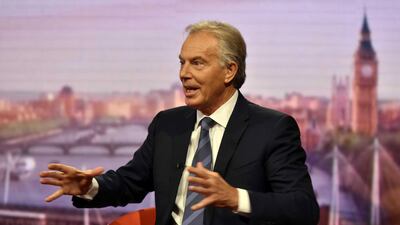Tony Blair has called for new rules to tighten immigration rules to the UK to try to keep the country in the European Union.
Mr Blair, who as British prime minister in 2004 allowed citizens from 10 new EU member states unrestricted working rights in the UK, said circumstances had changed following the 2008 financial crisis and increased competition for jobs.
He said that dealing with the issue could keep the UK within the EU while calming the anger of those who cited immigration as the key reason for voting to leave the 28-member free trade bloc.
“This decision is life-changing for this country,” he told the BBC following the release of a report by his institute detailing his plans. “We’ve got to see if there’s a way to meet legitimate grievances… but do it in a way that doesn’t undermine the economy, society, the country and its standing in the world.”
Mr Blair – who ran the country for a decade from 1997 – has been an outspoken critic of Brexit and the country’s approach to negotiations with the European Union about the terms of their departure.
His attempts to argue the case for staying in the union appear unlikely to succeed given the stance of the two main UK parties who have said they would respect last year’s referendum result.
Mr Blair and his supporters argue that the public was ill-informed about the likely impact of Brexit. Early difficult negotiations between the UK and EU have failed to resolve basic issues such as the ‘divorce bill’ that the UK will have to pay on departure in 2019.
_________________
Read More
Top UK drug maker refuses to support May's Brexit call
Jacob Rees-Mogg talks to The National about Middle East trade ties post-Brexit
________________
He said that it was “common sense” for the British public to make a final, irrevocable decision once the negotiations had concluded and it was clear what a future outside of the EU would look like.
The former prime minister’s attempt to keep Britain in the EU were doomed to failure, said Ken Clarke, a former cabinet minister for the ruling Conservative party and an outspoken campaigner to keep Britain in the EU.
“I think the mood in the country is it’s hopeless to expect that,” he told Sky. “What we now need to address is the practical consequences of what is our new relationship.”
Michael Fallon, the Defence Secretary, said Mr Blair had to accept the will of the people. “Tony Blair has got to get over it, and we've got to get a smooth and successful exit from the union,” he said.
Mr Blair won three general elections from 1997 to oversee Labour’s longest spell in government with an agenda promoting the economy and building public services, but his legacy has been tarnished by his decision to back the invasion of Iraq.
The immigration report was released by a new body set up last year by Mr Blair to promote the centre ground of UK politics and tackle the rise of ‘populism’ that he blamed for the Brexit vote.
Critics, however, pointed to his government’s failure to impose restrictions on new EU members, mainly from Eastern Europe, to work in the UK in 2004 for increasing tensions and allowing an influx of immigrants that changed the face of Britain.
He said those ‘open border’ arrangements were no longer appropriate with some communities resentful at newcomers taking jobs and depressing wages.
The report proposed new rules that would stop EU citizens having the right to reside without a job offer, saying that they would be barred from having bank accounts, renting homes or welfare benefits.
But the authors said it was “open to debate” on whether it would be possible to negotiate the proposed change on freedom of movement with the remaining EU members.
Mr Blair said that a greater problem came from outside of the EU, citing figures that suggested that immigration of non-EU citizens was higher at 264,000 compared to 250,000 from within the EU, according to his report.
He said that the only way to make a success of Brexit is to turn Britain into a Singapore-style low-tax, low-regulation country competing with the European Union but said that voters would not back such a major change to the economy.
It would result in likely election success for Labour under Jeremy Corbyn, from the left-wing of the party who has rejected the approach of his Mr Blair’s so-called New Labour project.


